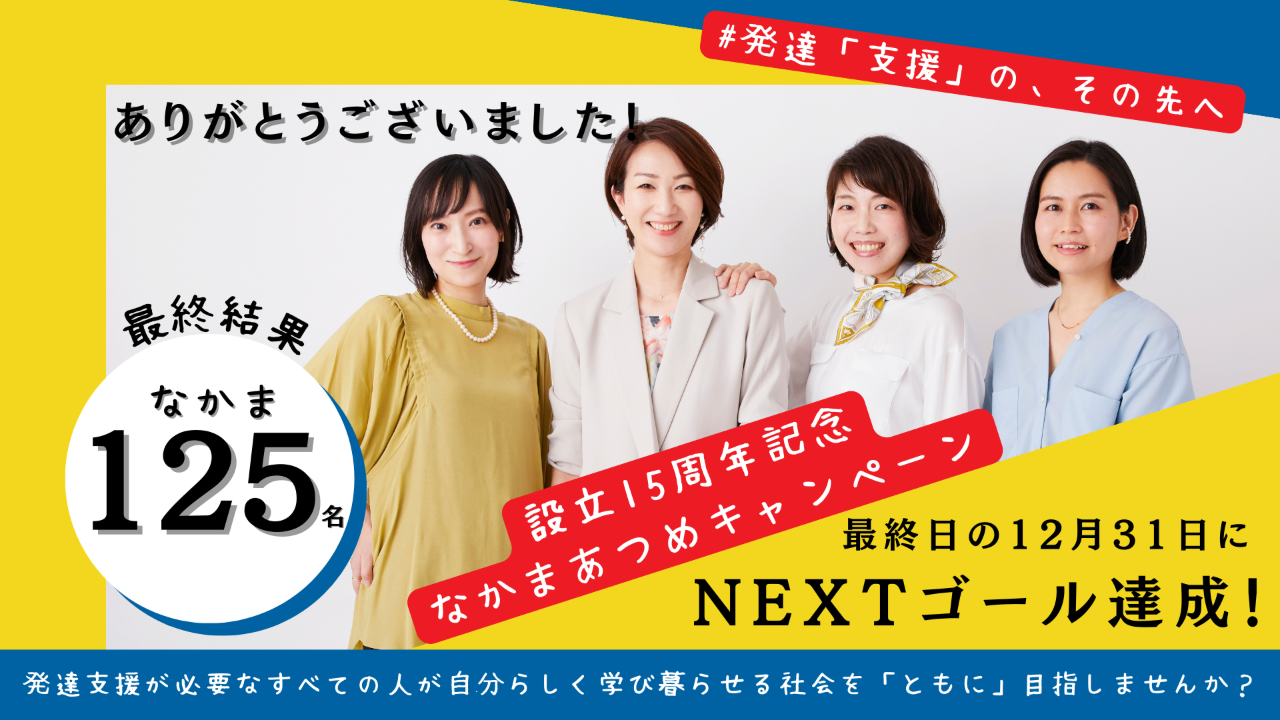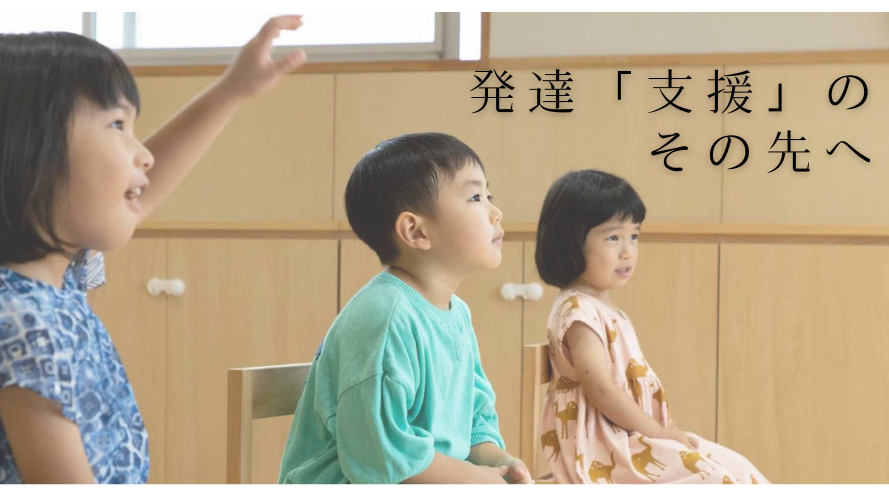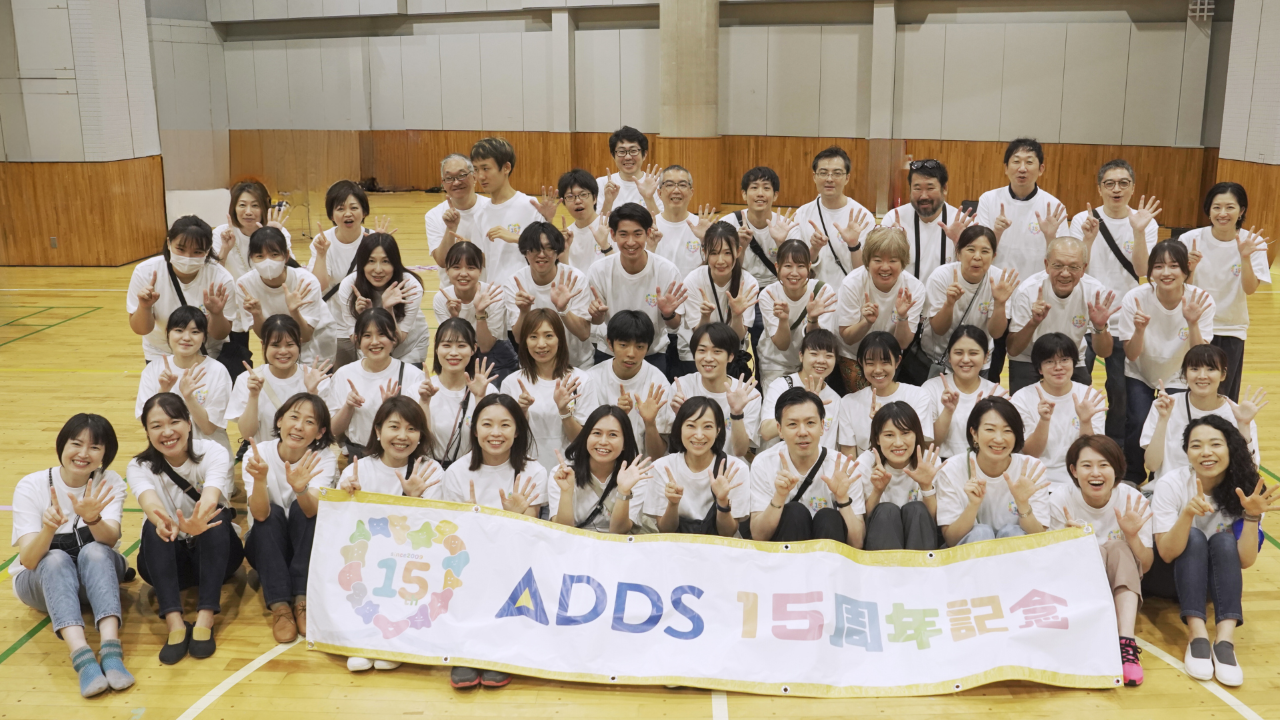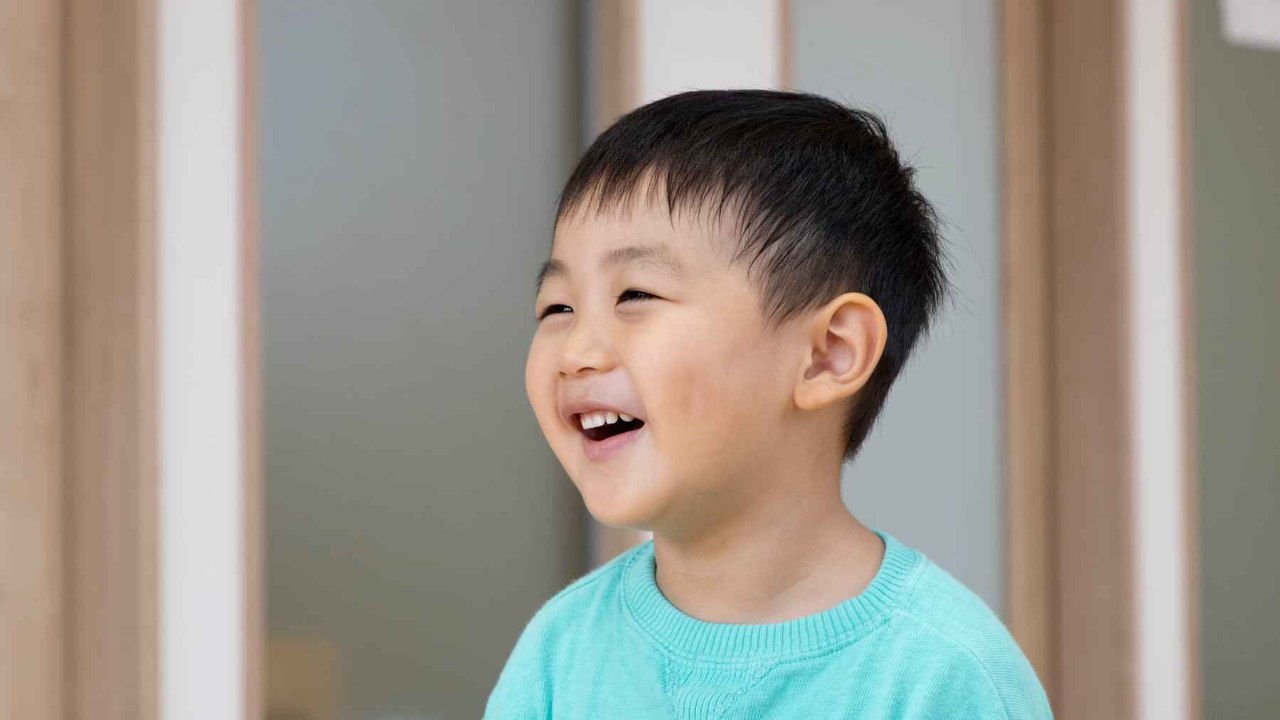
Our Mission
To create a society where everyone who needs developmental support can learn in their own way and live with hope.

If we can create a society where everyone, regardless of disorders or their birth environment, is guaranteed learning opportunities that matches their developmental characteristics, the concept of "developmental disorders" will no longer be needed.
We aim to collaborate with people from all walks of life through evidence-based practices to achieve this hopeful vision of society.
Come be a part of our journey!!
With only $6.50/month, you can make a difference in a country that seems very far away but is in need of societal change so that these wonderful children can thrive in their own way. They deserve to be provided such environment and we, as a small but big-hearted non-profit are committed to make it happen.
Your support plays a crucial role in advancing our mission to create an inclusive society where everyone can thrive. Please take a moment to learn about what we do and who we are.
Differences Between the U.S. and Japanese Donation Markets
In the United States, philanthropy is deeply ingrained in the culture, with donations seen as a vital way to contribute to society and support meaningful causes. Americans donated over $484 billion to charities in 2021 alone, driven by a strong sense of civic responsibility, religious traditions, and tax incentives that encourage giving. This culture of giving ensures that even grassroots organizations can receive substantial support to drive change and address societal challenges.
In Japan, however, the donation culture is still underdeveloped. Annual charitable giving in Japan amounts to just over $7 billion—less than 2% of the U.S. total, despite Japan being the third-largest economy in the world. Many factors contribute to this, including a lack of tax incentives, limited public awareness about the impact of donations, and a cultural tendency to rely on the government to address social issues. As a result, nonprofit organizations in Japan often struggle to secure the funding needed to sustain their activities and expand their impact.
Why Your Support Matters
At ADDS, we are working tirelessly to address developmental support challenges and create a society where every individual can thrive. Unlike in the U.S., where philanthropic contributions fuel countless transformative initiatives, Japanese nonprofits like ours face significant hurdles in attracting donations. Your support as an international donor could make a world of difference.
By donating to ADDS, you’re not only helping us provide life-changing support to children and families in Japan but also pioneering a culture of giving that can inspire others to join this movement. Your generosity can:
- Help sustain programs that offer developmental support to children and families who need it most.
- Empower us to train the next generation of professionals in the field of developmental support.
- Support innovative tools like our AI-PAC system, which makes high-quality developmental care accessible across the nation.
Be a Catalyst for Change
As someone who understands the power of giving, your contribution could be the spark that helps build a more robust culture of philanthropy in Japan. Together, we can bridge the gap and ensure that children and families in Japan receive the support they deserve. Your donation doesn’t just help us—it transforms lives and sets an example for others to follow.
Join us in making a lasting impact. Together, we can create a brighter future for children, families, and communities across Japan. Thank you for your generosity and belief in our mission!
Your generosity knows no borders.
Join us today and be part of this transformative journey!
Differences Between Support for Children with Developmental Disorders in the U.S. and Japan
In the United States, children with developmental disorders often benefit from a well-established and systematic support structure. Early identification and intervention are prioritized, with many states mandating screenings for developmental delays at a young age. Once identified, children have access to services like Applied Behavior Analysis (ABA), speech therapy, occupational therapy, and Individualized Education Programs (IEPs) that cater to their specific needs. Parents are generally well-informed and actively advocate for their children, driven by a strong cultural emphasis on empowerment and education.
In contrast, Japan faces significant challenges in providing consistent and timely support to children with developmental traits:
- Delays in Accessing Support: In Japan, it often takes years for families to reach proper therapeutic services due to a lack of early screening systems and awareness. By the time support is available, critical early developmental windows may have already passed.
- Inconsistent Quality of Support: The quality of developmental support (known as “ryoiku”) varies widely depending on the region and the available resources. Some areas have excellent services, while others leave families with few, if any, options.
- Low Sense of Urgency Among Parents: Cultural attitudes sometimes downplay the need for intervention, with many parents assuming that their child will "grow out of it." This lack of urgency delays critical support and leaves children without the help they need during formative years.
These systemic issues result in a significant gap between the level of support available in Japan and what is offered in the United States.
ADDS's Role in Bridging the Gap
Over the past 15 years, ADDS has been working tirelessly to address these challenges and bring Japan closer to the comprehensive support systems seen in the United States. Our efforts have included:
- Raising Awareness: Through research, workshops, and public campaigns, we’ve been educating parents and communities about the importance of early intervention.
- Creating Accessible Tools: We developed the AI-PAC system to standardize and improve the quality of developmental support, making evidence-based resources available nationwide.
- Training Professionals: We’ve trained therapists, teachers, and social workers to ensure that they are equipped with the skills needed to provide high-quality support.
- Advocating for Policy Change: We’ve worked with policymakers to push for systemic reforms that prioritize early identification and equitable access to support services.
Working Together with Parents, Based on Evidence, to Transform Society
ADDS operates based on the following three principles:
COLLABORATING WITH PARENTS
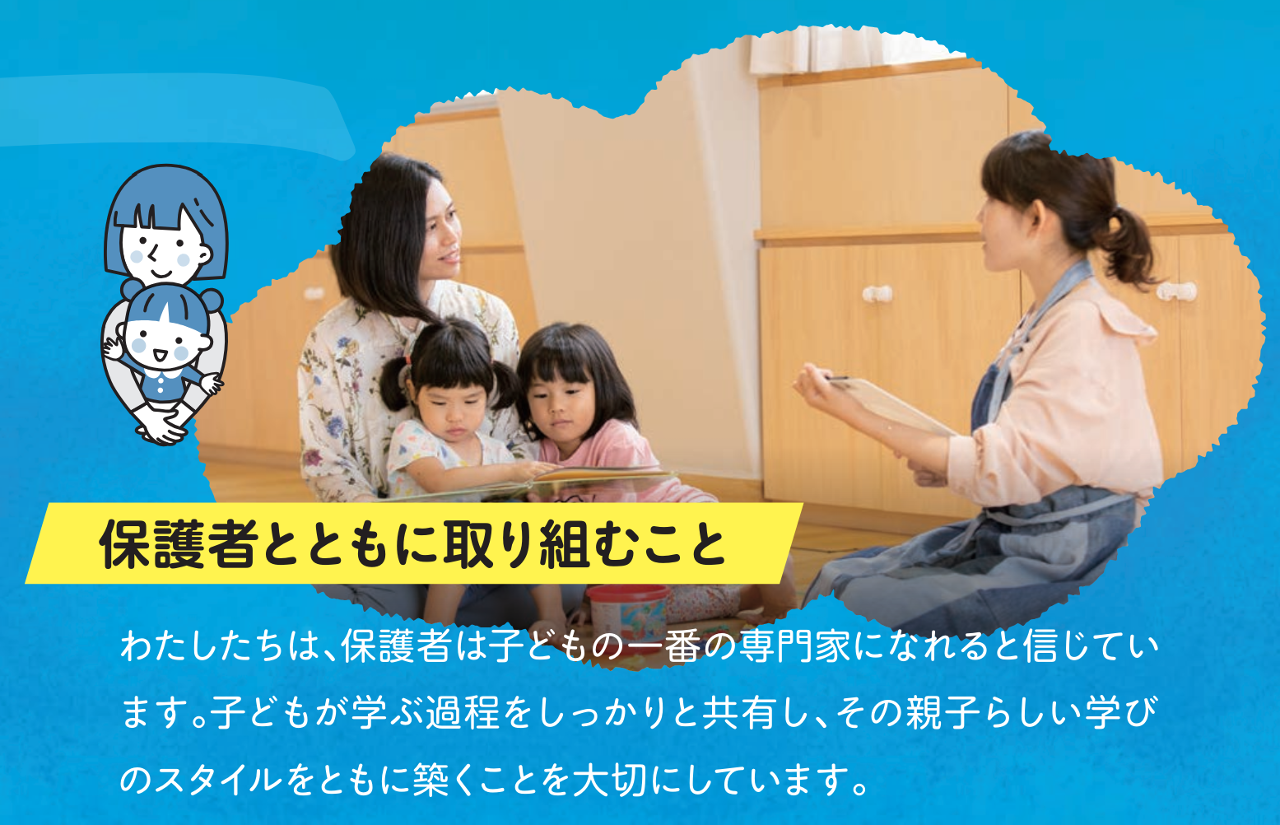
CHOOSING METHODS GROUNDED IN REDEARCH EVIDENCE
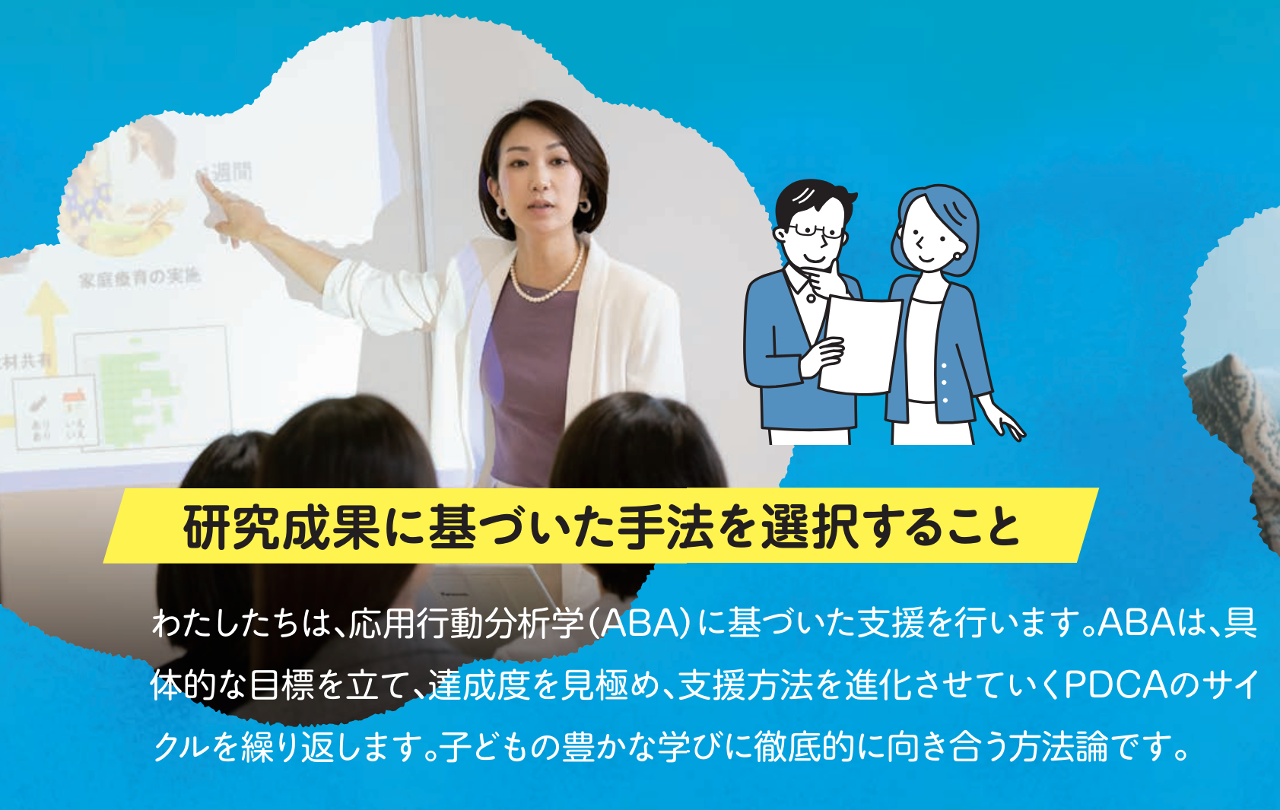
DRIVING SOCIETAL CHANGE
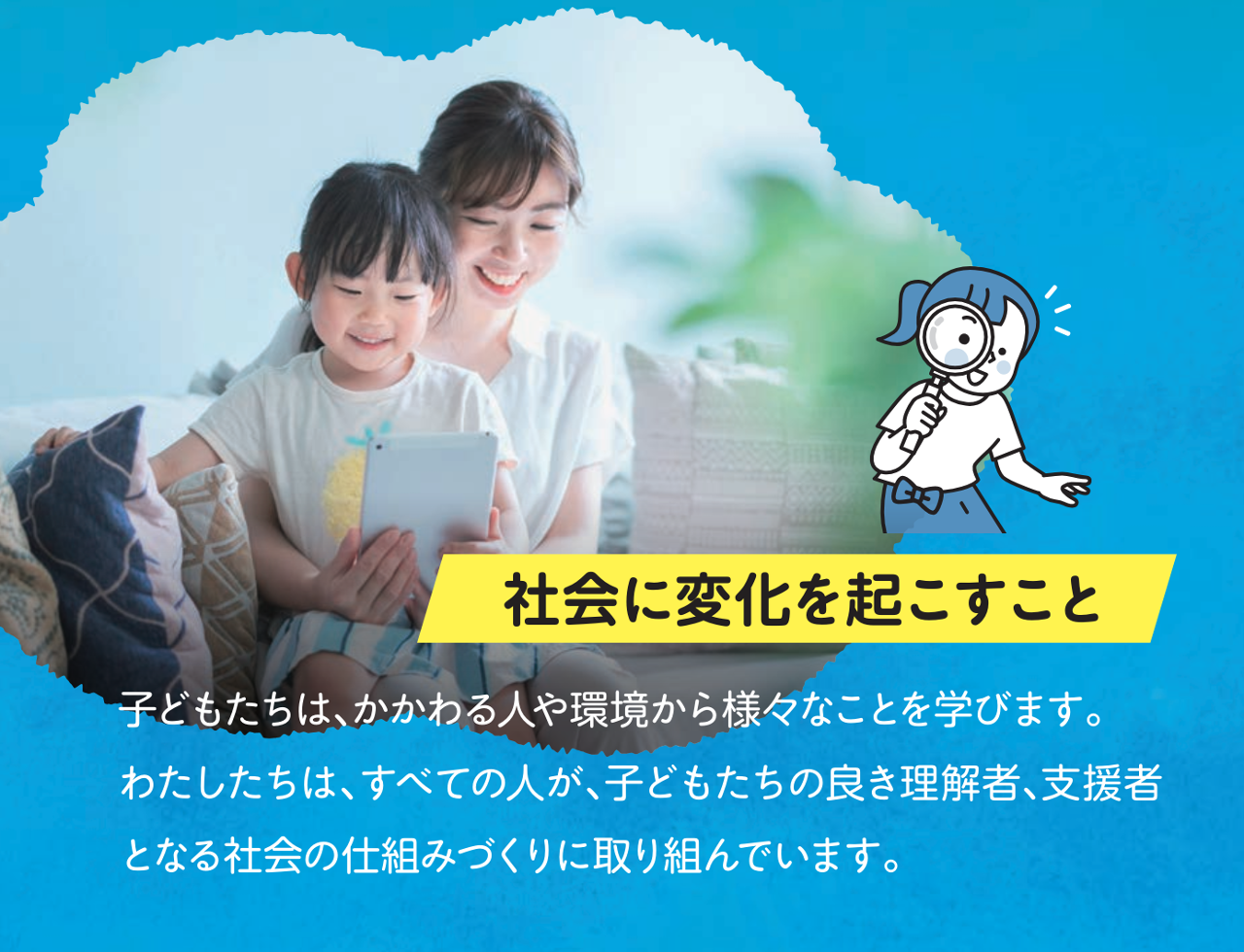
No one is irrelevant. Finding a society where the concept of "developmental disorders" is unnecessary will lead to a world where everyone can live uniquely and free.
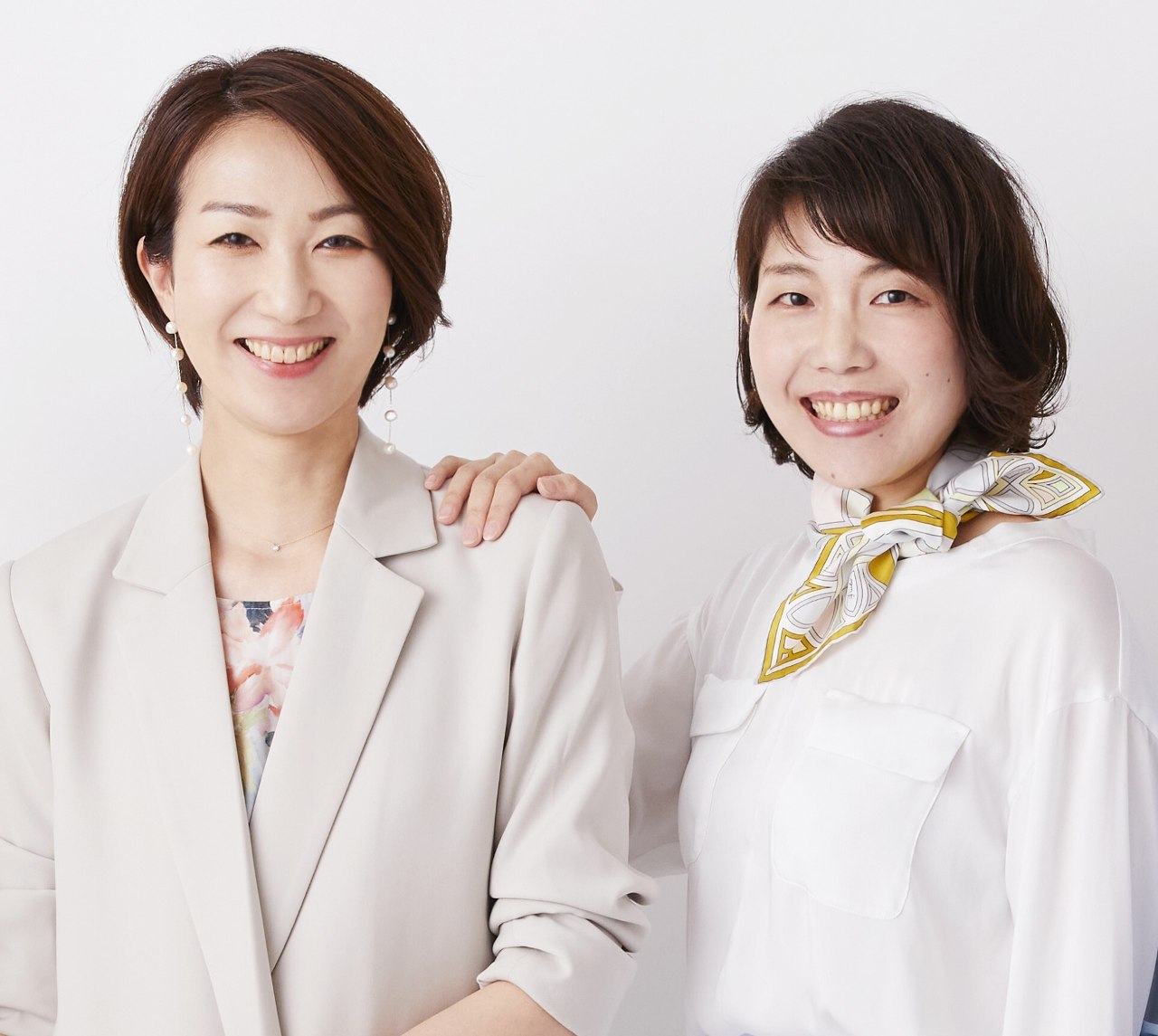
It has been15 years since ADDS was founded in 2009—
The term "developmental disorders" has become widely recognized in Japan. While the environment surrounding children has gradually improved, this nation still lacks widespread understanding, consideration, and evidence-based support for individual developmental characteristics.
Society continues to face diverse issues, including child-rearing challenges such as abuse and depression, truancy, social withdrawal, bullying, and behavioral disorders. These challenges often stem from mismatches between individual characteristics and their environment, leading to distress for children, families, and caregivers.
Through evidence-based developmental support, we have tackled these issues and witnessed extraordinary potential blossom in children, families, and supporters. This has allowed us to carry on these past fifteen years even through the global pandemic.
Looking back with gratitude for these years that has passed, we are deeply convinced of one thing:
The society we envision—where people with developmental characteristics can learn and live in their own way—is not limited to those with special needs.
At the heart of our vision lies a society where "everyone is respected for their differences and strengths, supporting one another." This is about creating a society where everyone can live authentically and with ease. If individual differences are truly respected, the concept of developmental disabilities would no longer be necessary. Such a transformation in societal norms concerns everyone.
Looking Forward to the Next 15 Years
We hope to connect with more people who share our aspiration to build a society where the concept of developmental disorders is unnecessary.
As a small non-profit, our capacity is limited. However, by gathering the small but diverse strengths and support of individuals like you, we can generate significant momentum to drive this societal change.
ADDS by the Numbers (from fiscal year 2022)

1
Number of Parents and Children Provided with Evidence-Based Developmental Support
--- Actual individuals: 359 (2021: 282), Total cases: 17,664 (2021: 7,303)
Reflects the unique and repeated users provided with evidence-based developmental services like AI-PAC® and "Peasuku."
Support was extended at Edogawa Ward Developmental Consultation and Support Center, ADDS kids 1st facilities, and other high-quality service locations nationwide with-in the ADS-NET network.
2

Number of Data Analyses--- 2,402,211 cases (2021: 1,928,581 cases)
A total of 2,402,211 data entries related to therapeutic issues stored in AI-PAC® were analyzed and researched.
AI-PAC® is an innovative application that supports individual children's progress management, family collaboration, support plan creation, and use of educational materials/videos based on a curriculum of 600 tasks across five developmental domains.
3

Number of Consultations Provided--- 10,586 people (2021: 8,059 people)
The total number of consultations offered includes support at the Edogawa Ward Developmental Consultation and Support Center and the online consultation service "kikotto," addressing various concerns.
4

Number of Supporters Provided with Learning Opportunities--- 5,082 people
Through training, symposiums, workshops, therapist development, practical training, and other activities, we provided "learning opportunities for supporters." (2021: 2,552 people)
※Excerpt from the2022 Annual Report
Celebrating Our 15th Anniversary: Thoughts for the Future
"bringing support for ALL,
stand TOGETHER for a better future."
Our New Mission:
In 2020, ADDS staff gathered to reflect on what kind of society we aim to create and what we wish to deliver to whom. As a result, we redefined our mission:
To create a society where everyone who needs developmental support
can learn in their own way and live with hope.
This mission embodies our commitment to leaving no one behind and co-creating a better future with all stakeholders.
Thanks to everyone’s support, our organization has successfully navigated the challenges of the global pandemic since 2020. During this time, we have strengthened our organizational foundation and established a stable operation of our day service facilities. Alongside the expansion of institutional programs, our organization has also grown in scale, initiating collaborative projects with local governments, including Edogawa Ward, and building a network with service providers across the nation in order to bring evidence-based support to various regions.
Challenges and Efforts Moving Forward
Despite growing awareness, Japan's welfare policies still fall short of being evidence-based, requiring more effort to advocate for effective research-backed practices. Many individuals and families continue to struggle with the challenges associated with developmental disorders, making it clear that there is much work to be done to ensure "no one is left behind."
Over the past 15 years, we have faced challenges in fully addressing the needs of individuals and families caught in the gaps of existing systems, as well as in advocating for systemic changes, due to a lack of organizational capacity and resources. This is an issue we must confront moving forward.
There are many parents and children in disaster-affected areas who require developmental support. Similarly, children facing developmental challenges are present in economically disadvantaged households, among foreign residents in Japan, and even among those struggling with school absenteeism.
Non-profit like ours must focus on bridging the gaps in existing systems, delivering support to those overlooked by current policies, and working to integrate these efforts into the broader framework.
However, sustained activities in unsupported areas require more than our resources alone.
In order to move forward, we are determined to work more closely with all of you to bring about meaningful societal change. This is a commitment we take seriously, and we are ready to dedicate ourselves fully to this mission.
Accelerating Three Key Initiatives
"Natural Disaster × Developmental Disorders"
Origins of Our Disaster Relief Effort
Our commitment to disaster relief began in 2011, during the Great East Japan Earthquake. At the time, ADDS was in its early stages, with the founding members handling their own cases and offering support in rented spaces on different days of the week. We were serving approximately 20 families—children and their parents.
Co-founder Kuma was enrolled in a doctoral program, while Takeuchi was attending night classes in graduate school and preparing for childbirth. Amidst these personal and organizational constraints, the earthquake struck, and many NPOs, NGOs, and volunteers quickly mobilized to provide emergency relief in the affected areas. ADDS, too, was asked to provide support in the disaster-stricken regions.
Driven by the belief that children's developmental opportunities must not be compromised even during a disaster, we discussed how we could contribute. However, with all team members managing cases in our local area and facing both financial and manpower limitations, we made the difficult decision not to participate directly in on-site relief efforts.
Progress and Challenges Over the Last 12 Years
In the 12 years since, Japan has faced numerous earthquakes and floods. Many disaster relief organizations have made powerful contributions during these events. ADDS, too, has grown significantly during this time, expanding to three locations and increasing its staff from four to 70 members. We have developed and systematized our expertise in developmental support, engaged in human resource development, and disseminated research findings.
Despite these advances, we have yet to engage in concrete disaster relief activities. The regret from 12 years ago remains unresolved, and our lack of experience and expertise in emergency response has become a barrier to entry in this area.
A Turning Point: The 2024 Noto Peninsula Earthquake
On New Year’s Day 2024, the Noto Peninsula Earthquake struck. This time, with the support of NPOs specializing in emergency relief, ADDS team members visited the affected area. We had the opportunity to speak with local residents, government officials, and other relief providers.
We learned that while the immediate post-disaster phase focuses on life-saving efforts, providing essentials like water, food, and clothing, and restoring infrastructure, the transition to the recovery phase reveals pre-existing community challenges in sharper focus.
Recovery becomes a long-term effort requiring residents to take the lead, supported by external expertise, manpower, and financial resources. This multi-year endeavor is critical to building the future of the community.
Our Role: Leveraging Expertise in Developmental Disabilities
Amid these recovery efforts, there is a clear need for support related to child-rearing and developmental disabilities. ADDS’s specialized knowledge can play a vital role in addressing these needs.
Furthermore, the lessons learned from disaster-affected areas can help us prepare for potential future disasters in metropolitan areas and contribute to improving evacuation shelters and other disaster response systems.
Donations will be carefully utilized for activities such as providing online developmental consultations to disaster-affected residents, conducting on-site assessments, and delivering developmental support initiatives.
We are committed to using our expertise to make a meaningful impact in disaster recovery and preparedness, ensuring that no child’s developmental opportunities are overlooked.
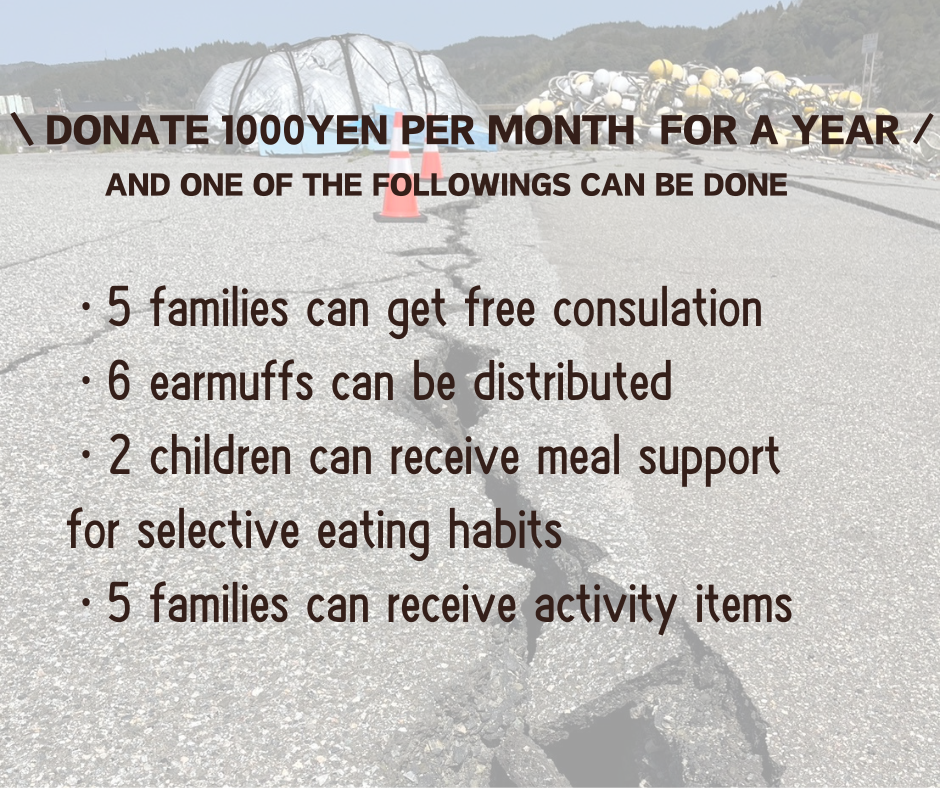

"Poverty × Developmental Disorders"
Supporting A, a child with severe intellectual disability and autism, and his family:
Preventing homelessness while ensuring a stable environment that caters to his needs,
allowing him to attend a special needs school.
▼Case Study: Refugee Parent and Child Facing Severe Disabilities
We first met A-kun when he began attending a facility operated by ADDS at the age of three. Diagnosed with autism and severe intellectual disability, A-kun’s mother had fled persecution in her home country and sought refugee status in Japan.
At the time, A-kun struggled to speak or understand language and had extreme difficulty adapting to changes in his environment. Even small changes in people or settings could lead to severe tantrums or panic attacks. He frequently engaged in self-injurious behaviors, such as hitting his head, or acted out impulsively by grabbing others.
Despite facing a language barrier, A-kun’s mother diligently attended the facility with him, working on communication skills, toilet training, and other daily life skills. For three years, she and the developmental support staff worked tirelessly together to help A-kun thrive.
▼Breaking Barriers: Unlocking Potential Across Languages and Borders
By the time A-kun turned six, the progress he had made was remarkable. Through clapping gestures, he could communicate basic needs such as "[I want to eat]" or "[I want this]." He began using photo cards of buses and toilets to understand daily schedules. Once limited to eating only plain rice, A-kun started trying various school lunch dishes.
▼The Challenges of Provisional Release and Developmental Disabilities
However, just as A-kun was preparing to enroll in a special needs school, his family’s refugee application was denied, leaving them in a state of provisional release. This change plunged them into severe poverty.
Although we explored placing the family in refugee shelters in collaboration with specialized organizations, A-kun’s developmental disabilities made this extremely challenging. He experiences high levels of stress in unfamiliar environments, which can lead to self-harm, aggressive outbursts, and loud vocalizations. Prolonged stays with others in shared spaces are unfeasible, and long-distance travel by train, bus, or plane is also difficult. His selective eating further complicates access to suitable food.
While we’ve collaborated with refugee and poverty-focused organizations, child welfare centers, public health offices, and disability support facilities, the mother’s inability to work has left the family on the brink of homelessness. The children now face hunger, with homelessness becoming a looming reality.
▼
What We Can Do: Utilizing Our Expertise in Developmental Disabilities
We’ve undertaken three key initiatives, leveraging our expertise:
- Social Work:
We’ve connected the family with refugee and poverty-focused organizations, communicating the severity and urgency of challenges stemming from A-kun’s developmental disabilities.- Documentation for Advocacy:
We’ve conducted developmental and behavioral assessments to create documentation explaining A-kun’s characteristics and the necessity of tailored support for housing, food, and education. This has included support for filing for special residency permissions with immigration authorities.- Provision of Basic Supplies:
We’ve gathered and distributed food, toys, and other items tailored to A-kun’s sensory sensitivities and dietary needs.Moving Forward
The family’s future remains uncertain, as the timeline for residency permissions is unknown. The inherent challenges of their situation are exacerbated by A-kun’s developmental disabilities, which create additional, unique barriers.
While we are not experts in refugee or poverty support, we are committed to working closely with specialized organizations to ensure A-kun has a safe environment that meets his needs. We will continue advocating for education and support tailored to his developmental characteristics.
Together, we can help families like A-kun’s find
stability and hope in even the most difficult circumstances.
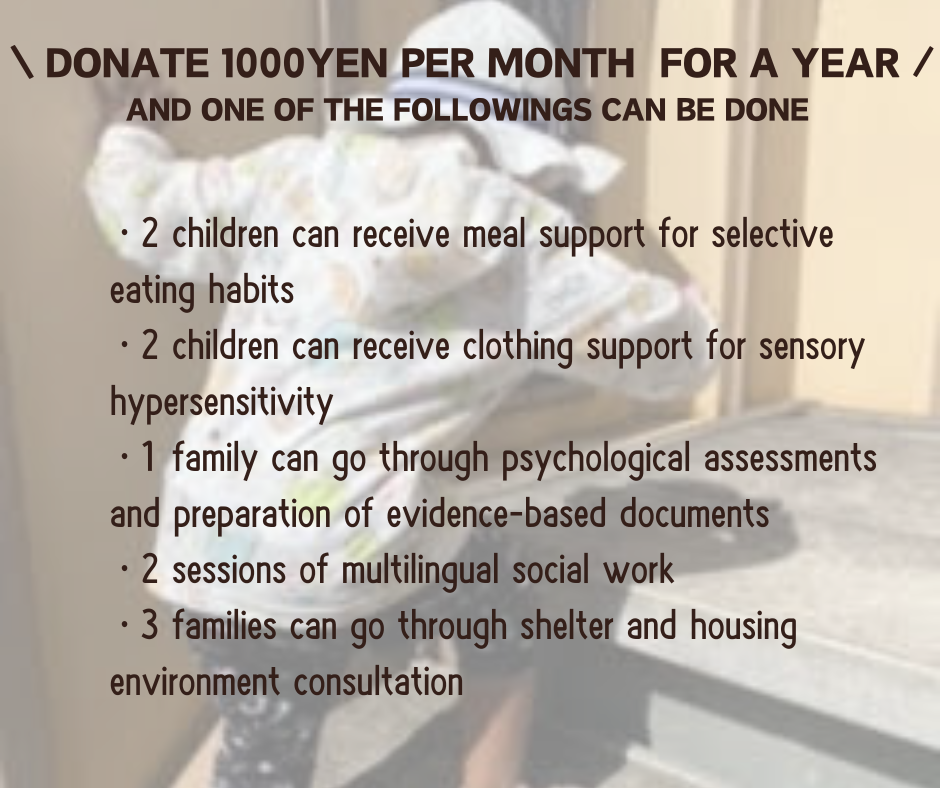
"Research, Advocacy, and Awareness"
Towards a Society Where the Concept of
Developmental Disorders Is Unnecessary
Towards the realization of a society where the concept of "developmental disoeders" is unnecessary, we build evidence through surveys and research. Utilizing these findings, we engage in policy proposals and awareness-raising activities, contributing to the development of future leaders and fostering societal change.
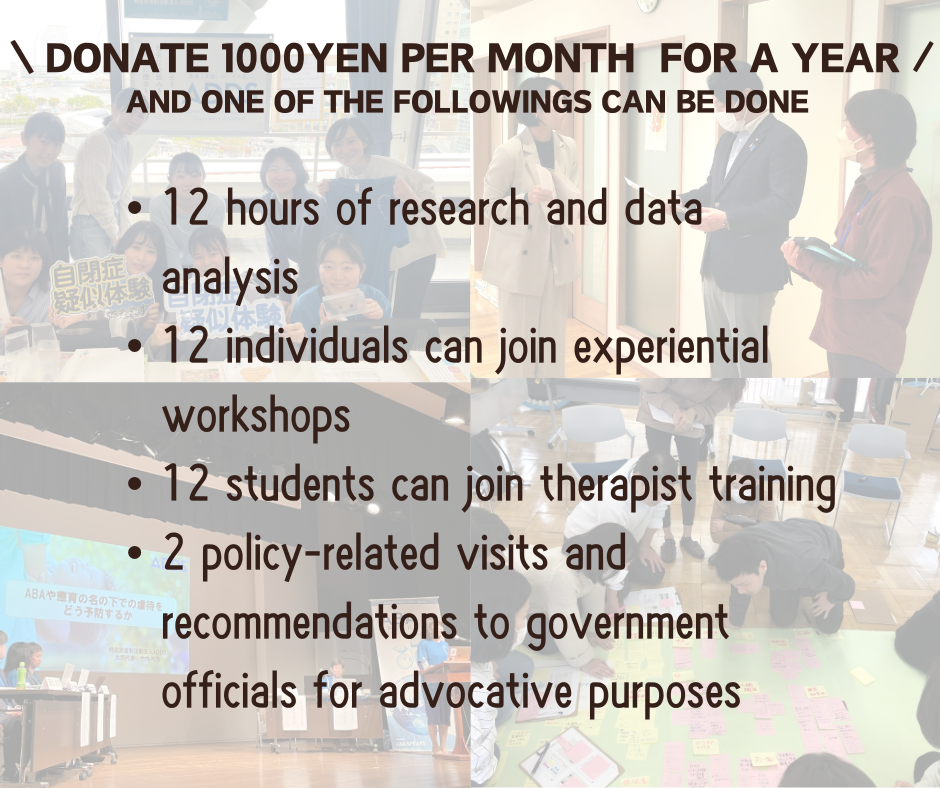
Examples of Initiatives Supported by Your Donations
Your generous contributions are utilized to support initiatives such as:
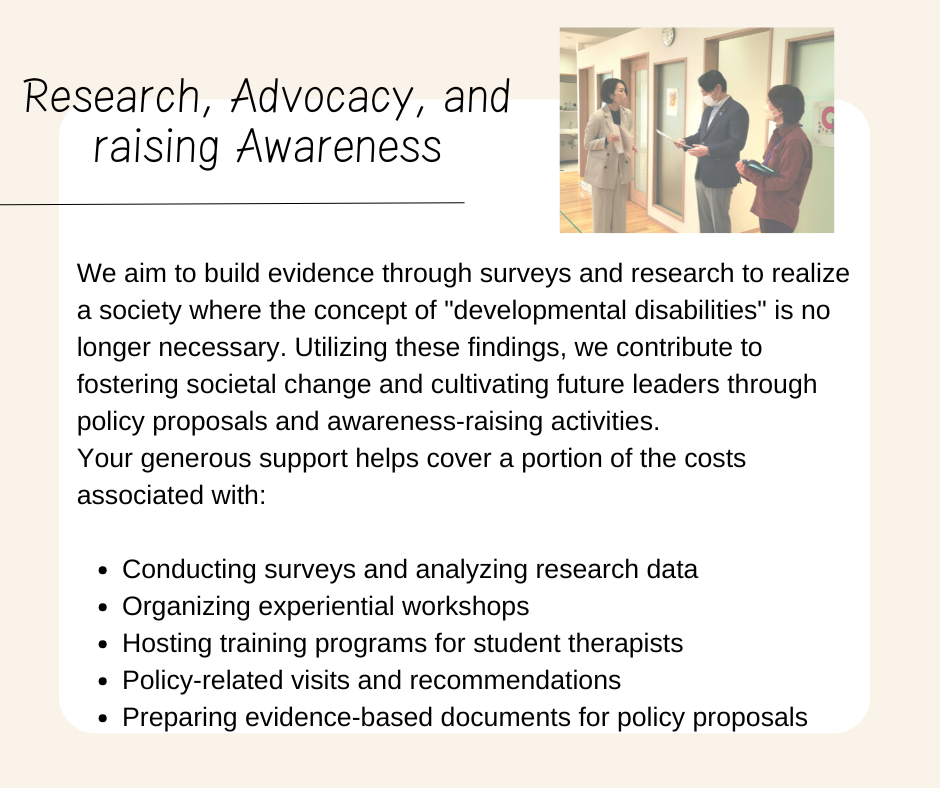
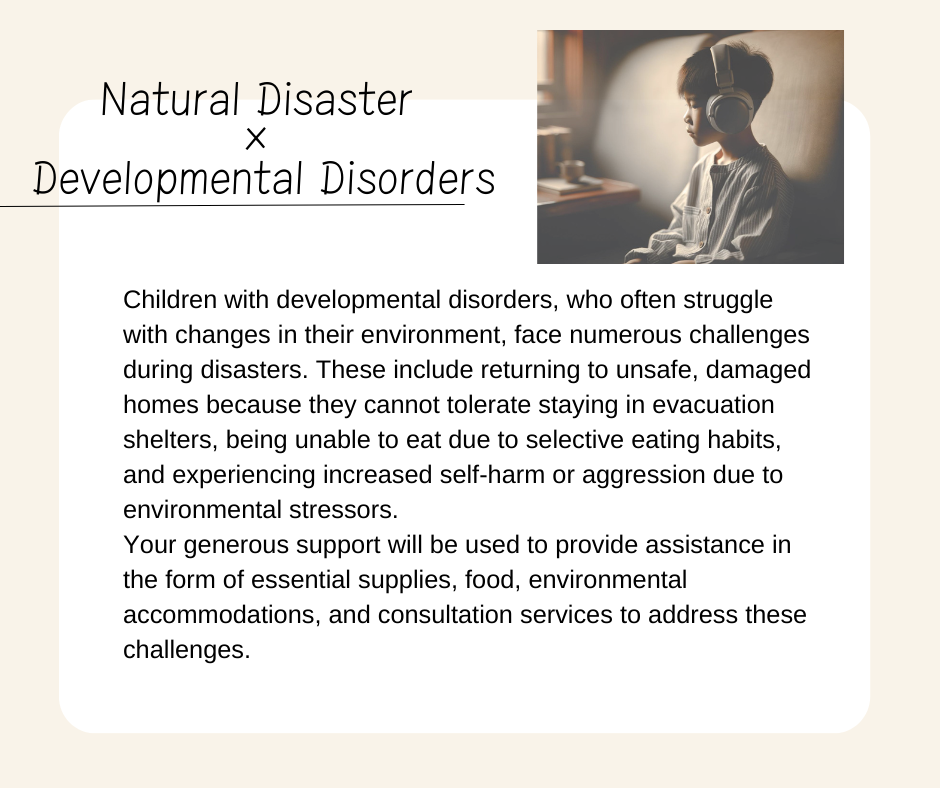
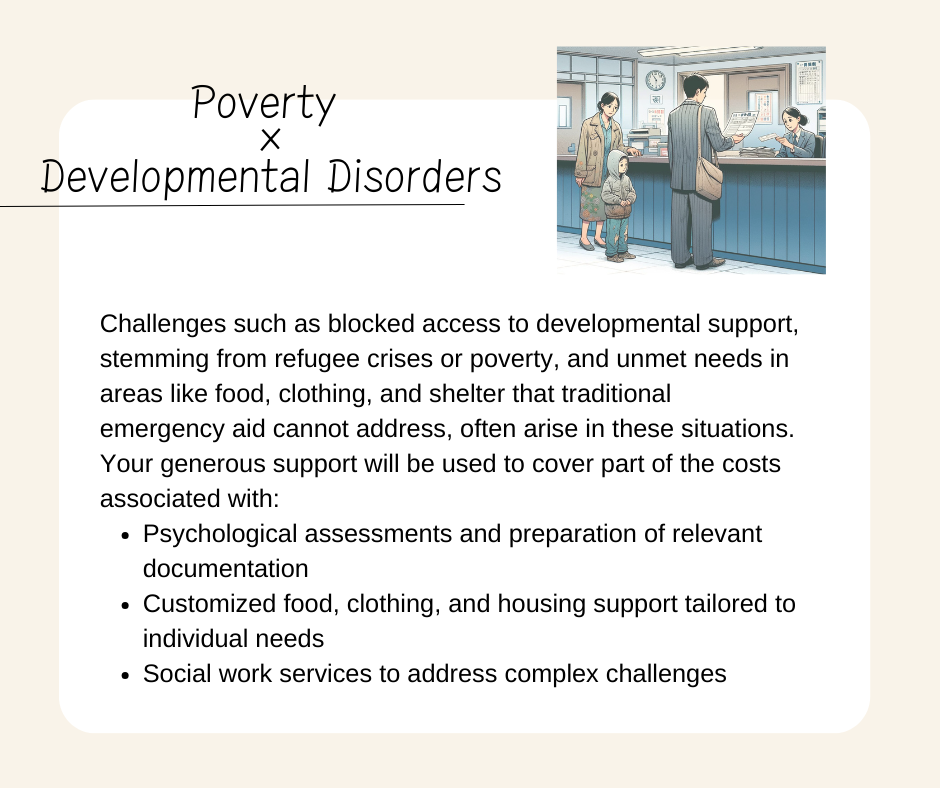
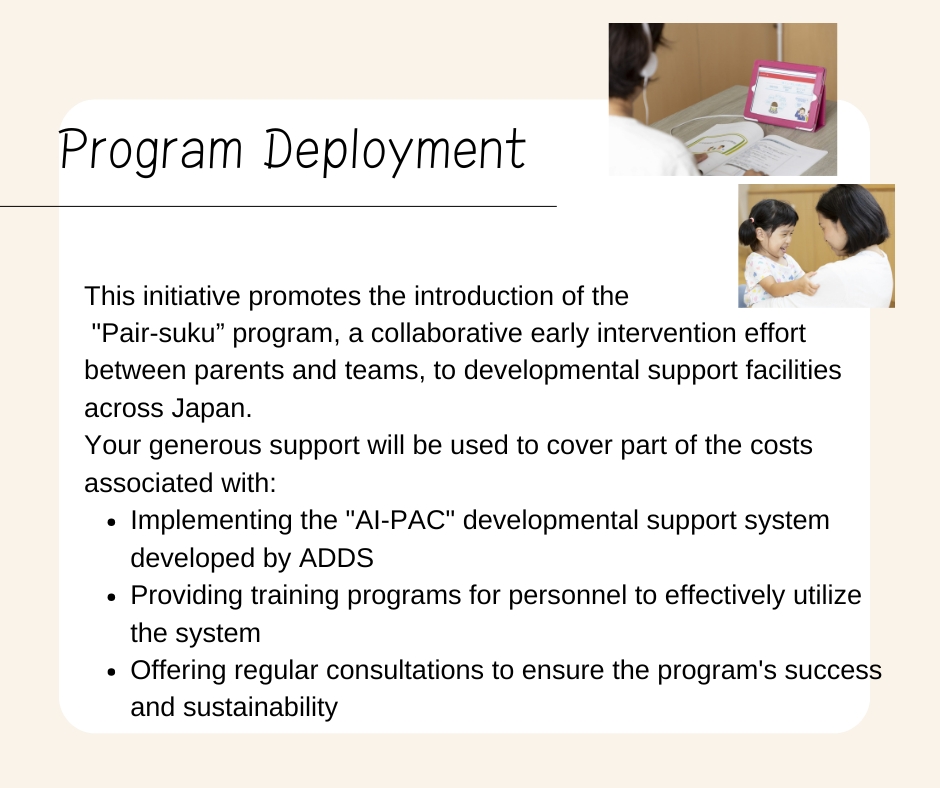
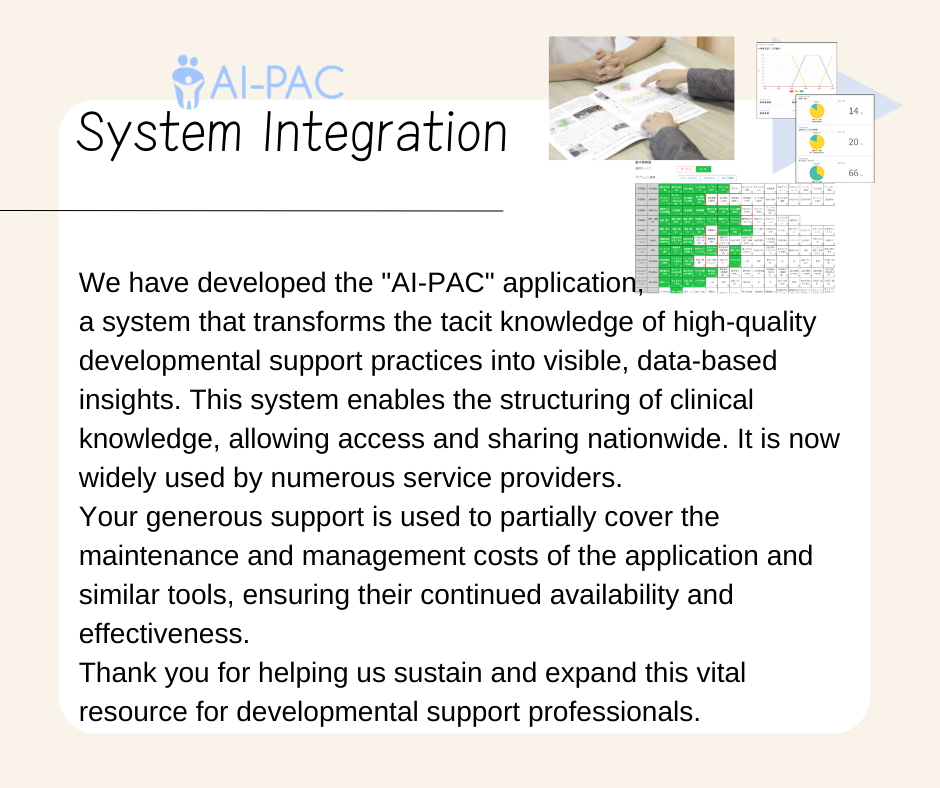
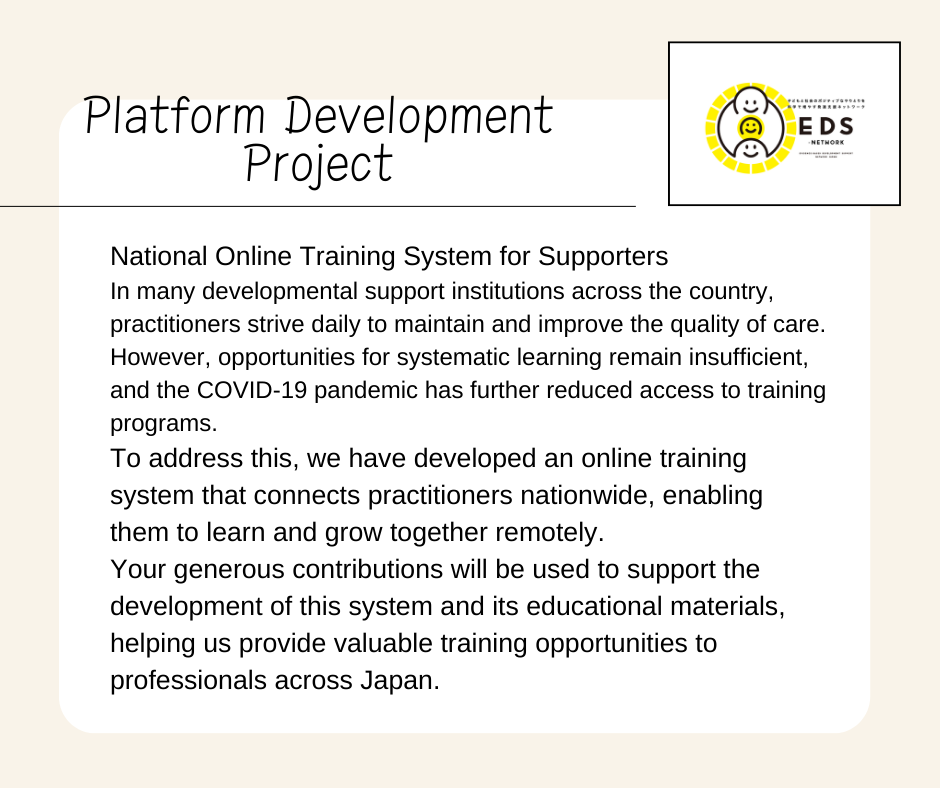
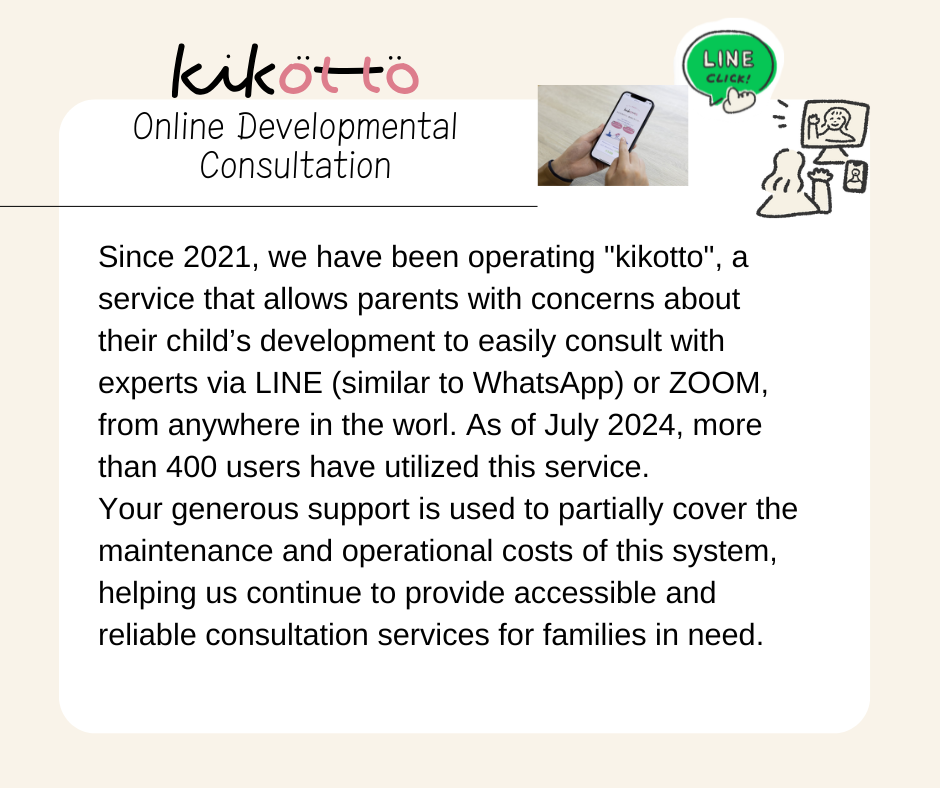
Other Uses of Donations
In addition to the initiatives mentioned above, your generous contributions are also utilized to support:
Less than 15% of the donations received are carefully utilized for overall expenses associated with activities that help us achieve ADDS’s mission. These include:
- Personnel and Transportation Costs: Supporting the staff involved in our activities and their travel expenses to ensure effective implementation of programs.
- Administrative and Management Costs:
- Payment system fees to facilitate smooth and secure donation processes.
- Website maintenance expenses to provide up-to-date information and resources to the community.
We ensure that these expenditures are managed efficiently, allowing us to maximize the impact of every donation toward achieving our goals. Thank you for your invaluable support in advancing our mission.
Reporting on the Use of Donations
We provide a detailed report on the use of donations to all our contributors through the distribution of our Annual Report. This serves as our official communication regarding the allocation and impact of your generous support.
Thank you for your trust and contributions, which enable us to continue our mission and make a positive difference.
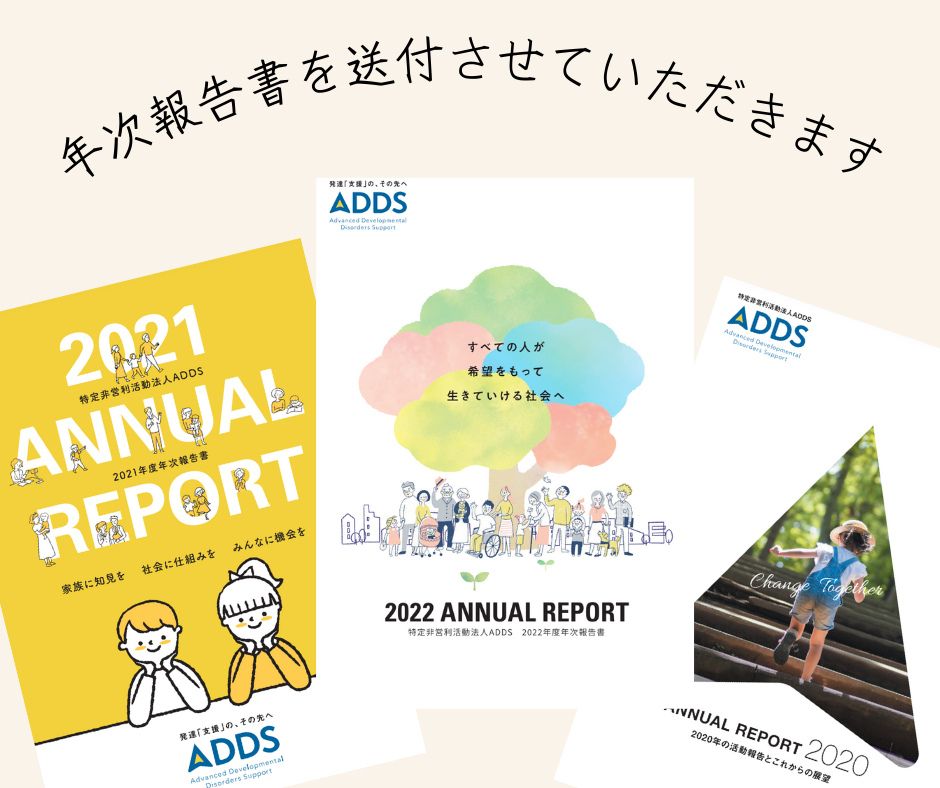
Our Supporters
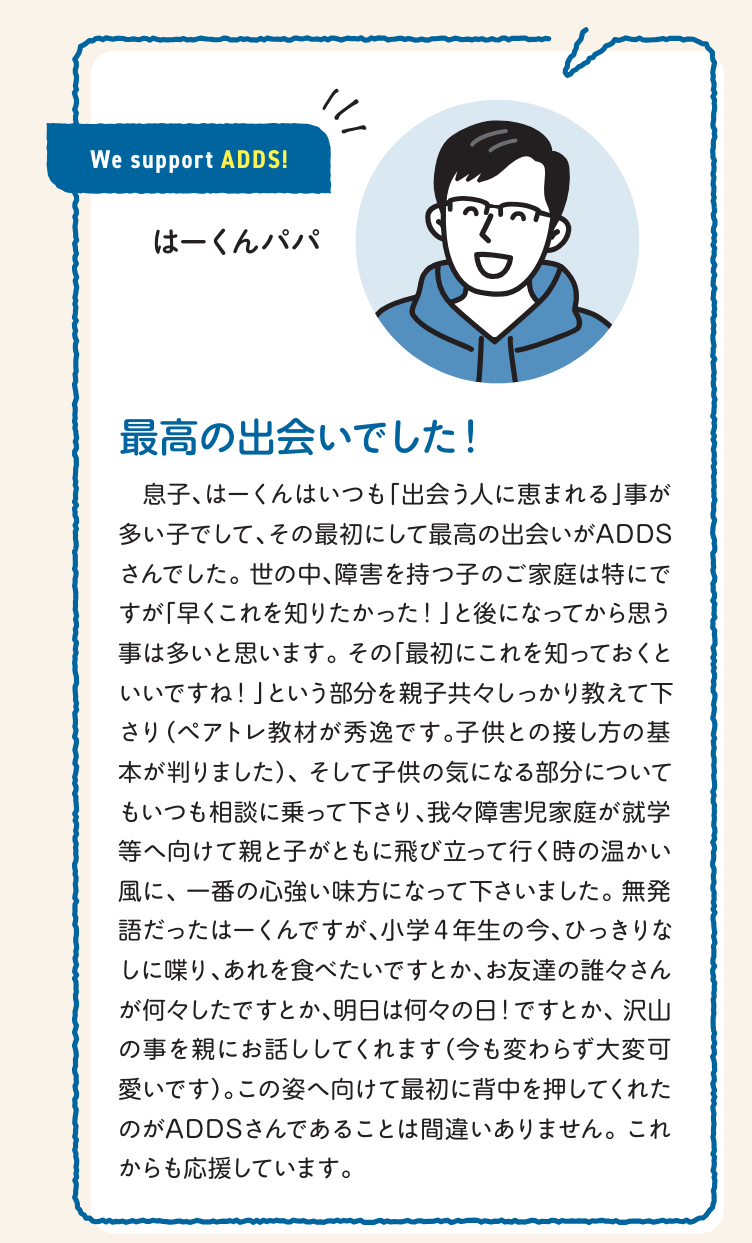
※Excerpt from the2022 Annual Report
Ha-kun’s Father
"The Best Encounter Ever!"
My son, Ha-kun, has always been blessed with wonderful people in his life, and ADDS was the first and the best among them. As parents of children with disabilities, many of us often think, "I wish I had known this earlier!" ADDS gave us that "early" start.
The materials, such as "peer-at-home" educational tools, are excellent for guiding parents and children. They laid the foundation for how to interact with my child and provided guidance on how to understand his needs. ADDS has been a warm and reliable partner for us as a family navigating school readiness and future challenges.
Although Ha-kun was non-verbal, he's now a cheerful 4th grader who talks about what he wants to eat, his friends, and even remembers upcoming events like "Tomorrow is Mountain Day!" This transformation wouldn’t have been possible without ADDS, who supported us from the very beginning. I'm proud to continue supporting ADDS and their invaluable work.

※Excerpt from the2022 Annual Report
Kunihiro Ogiwara, CEO of Zero One, Founder of Peace Mind
"Deeply Impressed by 14 Years of Progress!"
My connection with ADDS began around 2009 when its founding members—Mr. Takeuchi, Mr. Kumagai, Mr. Hara, and Mr. Kato—approached me as a volunteer group before graduating from Keio University. With shining enthusiasm, they shared their vision of using ABA to support children with developmental disabilities and their families. Back then, Japan was lagging in providing environments for therapy, but they were determined to establish programs for child development and therapeutic support.
Over the past 14 years, ADDS has steadily shaped its original vision into reality. From developmental support services, management projects, data analysis, and online developmental consultations, their sincere dedication and strong drive have been awe-inspiring. I have the utmost respect for their efforts and vision.
ADDS's mission to create "a future where the concept of developmental disabilities is no longer necessary" and to "build a society where everyone in need of support can learn, grow, and live with hope" continues to flourish and evolve since its founding. I'm excited to support ADDS with a sense of anticipation for the future.
Lastly...
Our Mission and Call for Support
What we can do is deliver evidence-based, highly specialized support to children and families who need it most, nurture future leaders in developmental support, and work tirelessly to create a society where differences are acknowledged, valued, and celebrated—regardless of disabilities. A society where everyone can live authentically, richly, and happily.
To continue addressing the diverse social challenges related to developmental support, we sincerely invite you to join us as one of our "partners" by contributing monthly. Your ongoing support will empower us to make a meaningful impact and create a better future for all.
Thank you for considering being part of our mission. Together, we can make a difference!
Please check our Privacy Policies 個人情報保護方針 and Rules and Conditions 寄付金等取扱規程 before proceeding to checkout

